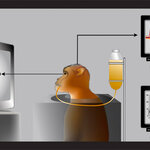New research from Columbia's Primate Cognition Laboratory has demonstrated for the first time that monkeys could acquire meta-cognitive skills: the ability to reflect about their thoughts and to assess their performance.
The study was a collaborative effort between Herbert Terrace, Columbia professor of psychology & psychiatry, and director of its Primate Cognition Laboratory, and two graduate students, Lisa Son — now professor of psychology at Barnard College — and UCLA postdoctoral researcher Nate Kornell.
The test used touch-screen technology and a multiple-choice format. Six novel…
Social Sciences

Researchers of the heart and headaches at Thomas Jefferson University Hospital are combining efforts to determine if a common heart defect may be the cause of some forms of migraine headaches.
Investigators from the Jefferson Heart Institute and the Jefferson Headache Center are enrolling participants in a blinded study to determine if closing a Patent Foramen Ovale (PFO), a small hole or flap that can allow blood to flow between the right and left sides of the heart, can stop migraines. In newborns, the PFO closes at or shortly after birth, but in 20 percent of adults the gap remains open…

Scientists know little about how the brain assigns cells to participate in encoding and storing memories. Now a UCLA/University of Toronto team has discovered that a protein called CREB controls the odds of a neuron playing a role in memory formation. The April 20 edition of Science reports the findings, which suggest a new approach for preserving memory in people suffering from Alzheimer's or other brain injury.
"Making a memory is not a conscious act," explained Alcino Silva, principal investigator and a professor of neurobiology and psychiatry at the David Geffen School of Medicine at…

In the children’s game "red light green light," winners are able to stop, and take off running again, more quickly than their comrades. New research reveals that a similar race goes on in our brains, with impulse control being the big winner.
"The research provides new insights into how the brain controls movements, which helps explain the impulsivity of people with attention deficit and hyperactivity disorder," study co-author Jeffrey Schall, E. Bronson Professor of Neuroscience at Vanderbilt University, said. "It also shows how mathematical models can be used to discover how the brain…

According to a new review of studies, women who received an advance supply of birth control pills for emergency contraception had the same chance of becoming pregnant as women who did not have early access to the pills.
Contrary to the fears of critics, the study says, the presence of Plan B does not provoke riskier sexual behavior but advance access to emergency contraception is also no antidote for the national problem of unintended pregnancy.
The review draws conclusions from eight studies of more than 6,000 women in the United States, India and China.
Plan B is a well-known brand of…

Temporal sequence represents the main principle underlying episodic memory. The storage of temporal sequence information is thought to involve hippocampus-dependent memory systems, preserving temporal structure possibly via chaining of sequence elements in heteroassociative networks.
Converging evidence indicates that sleep enhances the consolidation of recently acquired representations in the hippocampus-dependent declarative memory system. Yet, it is unknown if this consolidation process comprises strengthening of the temporal sequence structure of the representation as well, or is…

Whiskers provide a mouse with essential information to negotiate a burrow or detect movement that could signal a predator's presence. These stiff hairs relay sensory input to the brain, which shapes neuronal activity. In a first, studies of this system by Carnegie Mellon scientists show just how well a mouse brain can compensate when limited to sensing the world through one whisker. Published April 4 in the Journal of Neuroscience, the results should help shape future studies of sensory deprivation that results from stroke or traumatic brain injury, say the authors.
"Our findings are the…

The controversial idea that one cause of high blood pressure lies within the brain, and not the heart or blood vessels, has been put forward by scientists at the University of Bristol, UK, and is published this week in the journal Hypertension.
Dr. Hidefumi Waki, working in a research group led by Professor Julian Paton, has found a novel role for the protein, JAM-1 (junctional adhesion molecule-1), which is located in the walls of blood vessels in the brain.
JAM-1 traps white blood cells called leukocytes which, once trapped, can cause inflammation and may obstruct blood flow, resulting in…

In a study that could help reveal how illusions are produced in the brain's visual cortex, researchers at the UCSD School of Medicine have found new evidence of rapid integration of auditory and visual sensations in the brain. Their findings, which provide new insight into neural mechanisms by which visual perception can be altered by concurrent auditory events, will be published online in the April 12 edition of the Journal of Neuroscience.
When subjects were shown a single flash of light interposed between two brief sounds, many subjects reported seeing two distinct flashes of light.…

Scientists have known for more than a decade that individuals with a certain gene are at higher risk for developing Alzheimer's disease. Now a new study helps explain why this is so.
The research, led by scientists at the Oklahoma Medical Research Foundation (OMRF), has uncovered a molecular mechanism that links the susceptibility gene to the process of Alzheimer's disease onset. The findings appear in the April 11 issue of The Journal of Neuroscience and may lead to new pathways for development of Alzheimer's therapeutics.
Approximately 15 percent of the population carries a gene that…